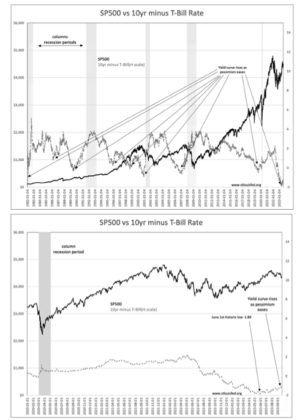“Davidson: submits:
The history of the yield curve shows that it rises prior to rises in equity indices. The interpretation requires looking at the pricing and the impact of individual issues in the SP500. The history of the 10yr Treasury minus the T-Bill rates(the accepted representation of the yield curve) is shown daily vs the SP500 from Jan 1982-Present, the long-term view, and Jan 2020-Present, the near-term view. The historic low was June 1st 2023 at -1.89%. Yesterday’s close was -1.03%. An rise of 0.86% in a little over 3mos. That is a significant shift for bond prices and it almost all came from a rise in the 10yr Treasury.
The interpretation bolstered by various price movements is that capital is leaving strategies favoring the 10yr Treasury and moving into equities. Energy, commodity and industrial issues have been rising in recent months. With the SP500 dominated by large tech issues, these shifts appear miniscule and do not register in the media. For individual issues which have been deeply depressed and have demonstrated insider accumulation, some have more than doubled in price with little impact on indices. These companies have repeatedly reported better than expected quarters and raised their guidance. Yet, they have been so depressed, they remain well below prior pricing metrics and at the moment carry inconsequential market influence. While key prognosticators fret that market prices are not leading them to economic conclusions, these issues are loud and clear, business is robust and continuing post-COVID. It is these companies that are seeing capital inflows.
As one looks at these charts, the rise in the yield curve begins well before there is a rise in the SP500 and often before the SP500 has made a bottom. It is a market of stocks. The dominant issues are not where investors need to be positioned but need to own those out-of-favor issues reporting expanding business prospects. Eventually, the indices feel the impact of the formally ignored. The industrials and commodity related issues are seeing early appreciation. This is likely due to recognition of business trends but also to the ability of these issues to pass on the impact of inflation and remain profitable.

In my judgement, the market remains is the early stages of turning attention towards many neglected issues. A significant rise in equities remains likely.